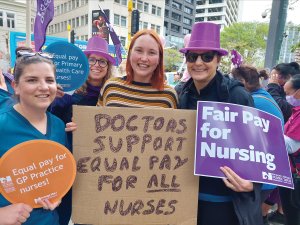Respiratory physician Lutz Beckert considers chronic obstructive pulmonary disease management, including the prevention of COPD, the importance of smoking cessation and pulmonary rehabilitation, and the lifesaving potential of addressing treatable traits. He also discusses the logic of inhaler therapy, moving from single therapy to dual and triple therapy when indicated, as well as other aspects of management
Imagining great after-hours care
Imagining great after-hours care

Retention of nurses is high because of excellent working conditions and there is a constant waiting list for nurses wanting to work there.
Imagine a healthcare system that includes 24-hour medical care clinics run by a large collective of GPs, all of whom agree to do a shift from a regular roster to spread the work evenly.
This after-hours system is supported by top quality registered nurses recruited well by ensuring they have the capability of having worked in a general practice and also have emergency care skills.
The frontline receptionists have also been carefully chosen by ensuring they have excellent interpersonal skills and can deal with all types of people interactions during the day or throughout the night.
The nurses as permanent staff ensure the clinical aspects and rosters run smoothly for both doctors and nurses including assessing when an extra GP at busy times might be required.
They are able to suture, take bloods and assess a fracture or dislocation.
They are skilled and well trained in the triage of all patients from the waiting area and will ensure that patients can be matched to a GP on duty who has a special skill or interest in a special area, such as paediatrics or aged care.
Retention of nurses is high because of excellent working conditions and there is a constant waiting list for nurses wanting to work there.
Wages reflect the expertise of the nurses such as time and a half paid on public holidays and double time paid on special holidays such as Christmas and Easter.
Nurses’ rosters are well planned so there is always a nurse ready to cover immediately for sickness or other sudden eventualities.
There is a full-time GP doing the night shift for house visits only and always accompanied by an off-duty policeman.
There is a Charge Practice Nurse to ensure ongoing and regular teaching and training sessions. Practice protocols ensure that everyone including the receptionists know their role clearly. All have to have emergency care training including for multiple casualties.
Every two months revision is a requirement for all nursing staff and during any quiet moments GPs on duty share their expertise with the nurses and supervise any necessary learning and upskilling required for primary healthcare.
Postgraduate education is encouraged with an emphasis on being aware of changing health trends. A key component is the triage phone system. Nursing staff constantly take calls and have to be competent and knowledgeable to deal with the wide variety over the 24-hour period.
All calls are logged onto simple telephone advice forms to provide good back up evidence if any complications occur later. These forms are gone though each fortnight with all the nursing staff as learning tools to discuss the advice given and the subsequent decision making.
The form clearly spells out nurse and caller details, time and date of the call, whether a follow-up call is necessary, and the action taken using quick key guides, house visit (HV), call referred to a GP (CGP), appt given (AG), casual patient (CAS), advice as below (AAB),ambulance called(AC), no further action (NFA).
If all this sounds a bit unreal I can assure you it was just as it was when the original 24 hour Surgery was first set up back in 1987 in Bealey Avenue in Christchurch.
The five years I spent there were the best years I have spent working in primary healthcare.
The GP who had the vision was a rarity at the time. He had the GPs behind him and knew if he could recruit the right nurses for the type of health delivery required he would be onto something. And he was.
From the outset the nurses felt really respected for their nursing ability and expertise. We were paid well because we were darn good at our job. There was no nurse employed who couldn’t demonstrate her ability to provide general practice care and also emergency care skills.
As Charge Practice Nurse my role was to ensure oversight and accountability and these nursing positions were always well sought after in Christchurch.
I found it fascinating that the doctors were always very happy for us to carry out the suturing and other clinical skills which they would normally choose to do themselves back in their general practice settings.
I had a look the other day at The 24 Hour Surgery as it is functioning today in its new location and I have to say I felt a bit sad. For obvious reasons some of the great things we experienced back in the day had to change. It is no longer the only after-hours surgery in Christchurch, funding has changed, costs are higher and fees have risen markedly.
Nurses are more often part-time, sometimes from general practice but also from other fields of nursing and all those I spoke to had no specific training for emergency care.
While it doesn’t always help to ponder too much on the past, there really isn’t any good reason not to retain the best of it.
As nurses we functioned happily and satisfied which is denied so many nurses today. We were happy because we were greatly respected by the GPs we worked with and above all we were paid well for a job we did with expertise, but we were also aware we had to show accountability every step of the way.
Thank you Dr Ian. You were a fantastic pathfinder all those years ago but the dream is over.








![Barbara Fountain, editor of New Zealand Doctor Rata Aotearoa, and Paul Hutchison, GP and senior medical clinician at Tāmaki Health [Image: Simon Maude]](/sites/default/files/styles/thumbnail_cropped_100/public/2025-03/Barbara%20Fountain%2C%20editor%20of%20New%20Zealand%20Doctor%20Rata%20Aotearoa%2C%20and%20Paul%20Hutchison%2C%20GP%20and%20senior%20medical%20clinician%20at%20T%C4%81maki%20Health%20CR%20Simon%20Maude.jpg?itok=-HbQ1EYA)
![Lori Peters, NP and advanced health improvement practitioner at Mahitahi Hauora, and Jasper Nacilla, NP at The Terrace Medical Centre in Wellington [Image: Simon Maude]](/sites/default/files/styles/thumbnail_cropped_100/public/2025-03/2.%20Lori%20Peters%2C%20NP%20and%20advanced%20HIP%20at%20Mahitahi%20Hauora%2C%20and%20Jasper%20Nacilla%2C%20NP%20at%20The%20Terrace%20Medical%20Centre%20in%20Wellington%20CR%20Simon%20Maude.jpg?itok=sUfbsSF1)
![Ministry of Social Development health and disability coordinator Liz Williams, regional health advisors Mary Mojel and Larah Takarangi, and health and disability coordinators Rebecca Staunton and Myint Than Htut [Image: Simon Maude]](/sites/default/files/styles/thumbnail_cropped_100/public/2025-03/3.%20Ministry%20of%20Social%20Development%27s%20Liz%20Williams%2C%20Mary%20Mojel%2C%20Larah%20Takarangi%2C%20Rebecca%20Staunton%20and%20Myint%20Than%20Htut%20CR%20Simon%20Maude.jpg?itok=9ceOujzC)
![Locum GP Helen Fisher, with Te Kuiti Medical Centre NP Bridget Woodney [Image: Simon Maude]](/sites/default/files/styles/thumbnail_cropped_100/public/2025-03/4.%20Locum%20GP%20Helen%20Fisher%2C%20with%20Te%20Kuiti%20Medical%20Centre%20NP%20Bridget%20Woodney%20CR%20Simon%20Maude.jpg?itok=TJeODetm)
![Ruby Faulkner, GPEP2, with David Small, GPEP3 from The Doctors Greenmeadows in Napier [Image: Simon Maude]](/sites/default/files/styles/thumbnail_cropped_100/public/2025-03/5.%20Ruby%20Faulkner%2C%20GPEP2%2C%20with%20David%20Small%2C%20GPEP3%20from%20The%20Doctors%20Greenmeadows%20in%20Napier%20CR%20Simon%20Maude.jpg?itok=B0u4wsIs)
![Rochelle Langton and Libby Thomas, marketing advisors at the Medical Protection Society [Image: Simon Maude]](/sites/default/files/styles/thumbnail_cropped_100/public/2025-03/6.%20Rochelle%20Langton%20and%20Libby%20Thomas%2C%20marketing%20advisors%20at%20the%20Medical%20Protection%20Society%20CR%20Simon%20Maude.jpg?itok=r52_Cf74)
![Specialist GP Lucy Gibberd, medical advisor at MPS, and Zara Bolam, urgent-care specialist at The Nest Health Centre in Inglewood [Image: Simon Maude]](/sites/default/files/styles/thumbnail_cropped_100/public/2025-03/7.%20Specialist%20GP%20Lucy%20Gibberd%2C%20medical%20advisor%20at%20MPS%2C%20and%20Zara%20Bolam%2C%20urgent-care%20specialist%20at%20The%20Nest%20Health%20Centre%20in%20Inglewood%20CR%20Simon%20Maude.jpg?itok=z8eVoBU3)
![Olivia Blackmore and Trudee Sharp, NPs at Gore Health Centre, and Gaylene Hastie, NP at Queenstown Medical Centre [Image: Simon Maude]](/sites/default/files/styles/thumbnail_cropped_100/public/2025-03/8.%20Olivia%20Blackmore%20and%20Trudee%20Sharp%2C%20NPs%20at%20Gore%20Health%20Centre%2C%20and%20Gaylene%20Hastie%2C%20NP%20at%20Queenstown%20Medical%20Centre%20CR%20Simon%20Maude.jpg?itok=Z6u9d0XH)
![Mary Toloa, specialist GP at Porirua and Union Community Health Service in Wellington, Mara Coler, clinical pharmacist at Tū Ora Compass Health, and Bhavna Mistry, specialist GP at Porirua and Union Community Health Service [Image: Simon Maude]](/sites/default/files/styles/thumbnail_cropped_100/public/2025-03/9.%20Mary%20Toloa%2C%20Porirua%20and%20Union%20Community%20Health%20Service%20in%20Wellington%2C%20Mara%20Coler%2C%20T%C5%AB%20Ora%20Compass%20Health%2C%20and%20Bhavna%20Mistry%2C%20PUCHS%20CR%20Simon%20Maude.jpg?itok=kpChr0cc)